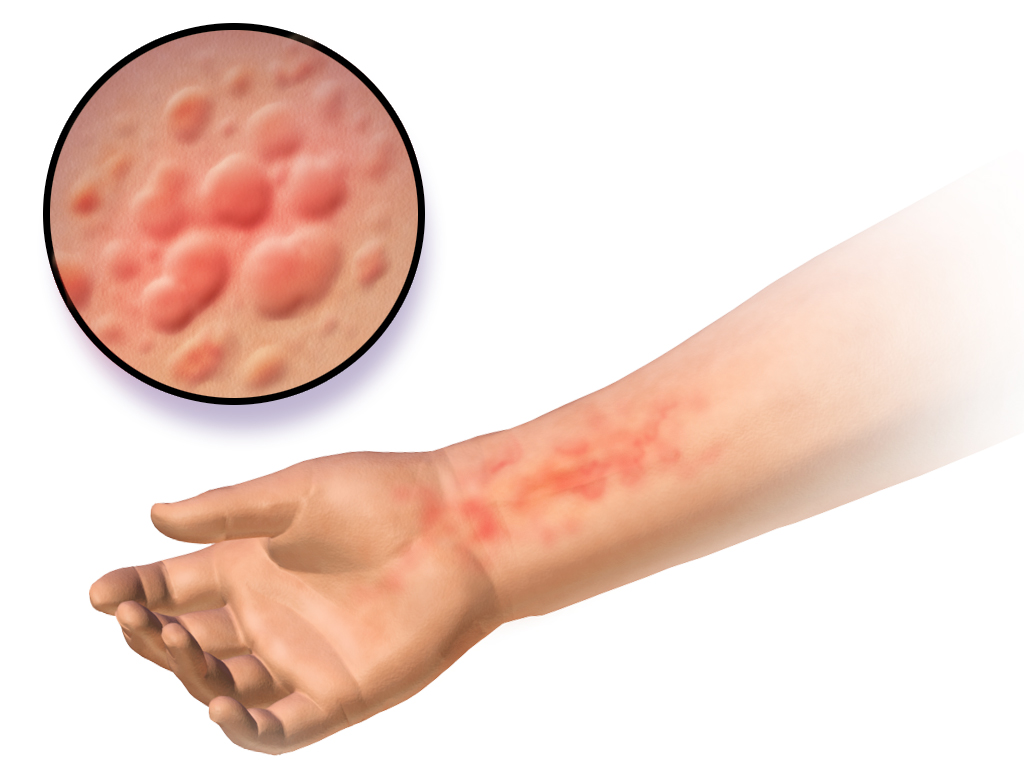Skin Allergies


Overview
Red, bumpy, itchy skin can be irritating, painful and embarrassing. Rashes can be caused by many things, including exposure to certain plants, allergic reactions to a medication or a food.
Conuslt our doctor for the best treatment.
Eczema
Eczema, also known as atopic dermatitis, affects between 10 and 20 percent of children and 1 to 3 percent of adults. A common symptom of eczema is dry, red, irritated and itchy skin. Sometimes, especially when infected, the skin may have small, fluid-filled bumps that ooze a clear or yellowish liquid. People with eczema often have a family history of allergies.
Hives
Hives (urticaria) are red bumps or welts that appear on the body. The condition is called acute urticaria if it lasts for no more than six weeks, and chronic urticaria if it persists beyond six weeks. Acute urticaria is most commonly caused by exposure to an allergen or by an infection. The cause of chronic urticaria is largely unknown.
FAQs
What does a skin allergy look like?
There are several different types of skin allergy reactions that allergists treat.
Eczema (also commonly called atopic dermatitis) typically results in dry, sensitive skin. You may experience red itchy patches. Eczema can come and go over time, and flare-ups may crack, ooze, and itch severely. It is very itchy and can vary in severity from mild (just dry skin ) to severe (red, scaly, thick, fissured and oozing skin)
Hives (also known as urticaria) are raised itchy bumps. Typically hives appear reddish, and will “blanch” (or turn white) in the center when pressed.
Contact dermatitis is typically caused by exposure to an allergen or irritant. If you have red itchy bumps on your skin, especially at the site of contact with some potential irritant or allergen, you may be experiencing contact dermatitis.
If you suspect you have any of these conditions, your allergist can conduct an examination and do testing to help determine the cause of your skin reaction and can recommend treatment to help relieve your symptoms.
How can I relieve the itching from my skin rash?
Avoid scratching! Scratching your rash or hives can create more irritation and can lead to infection. Frequent baths followed immediately with adequate moisturization may help ease your discomfort.
Allergists are specially trained to help treat your condition. Your allergist may prescribe a cream or oral medication to help alleviate your discomfort. Antihistamines and moisturizing ointments can also help ease irritation and dryness. Recently, new medications have been approved, including an ointment for mild to moderate atopic dermatitis and a biologic for moderate to severe atopic dermatitis. You can discuss these options with your allergist.
I haven’t changed anything about my usual routine – what could be causing my skin rash or hives?
There are many possible causes for your skin rash. Some types of rashes are caused by allergies, others may be caused by infections, skin conditions such as eczema or rosacea, or even just dry or damaged skin. Your allergist can help diagnose the cause of your symptoms and prescribe treatment to help you take control and find relief.
Should I stay out of the sun until my rash or hives are gone?
If your skin is already irritated or sensitive, exposure to UV rays and possible sunburn could cause you more discomfort. Take control of your condition by covering up and minimizing your time in direct sunlight.
In addition, some types of skin rash can be caused by the sun. Photoallergic contact dermatitis occurs when your skin has a reaction to an irritant or allergen after exposure to the sun. Cosmetics, sunscreen, shaving lotion, and perfume can trigger this kind of reaction.
Consult with your allergist to determine the cause of your skin reaction and the best course of treatment.
Could my skin reaction be caused by a food allergy?
Yes! A reaction to a food allergen can cause you to have a skin reaction like hives.
There are many possible causes for hives and rashes, so consult with your allergist to determine the cause of your symptoms and the best course of treatment.
